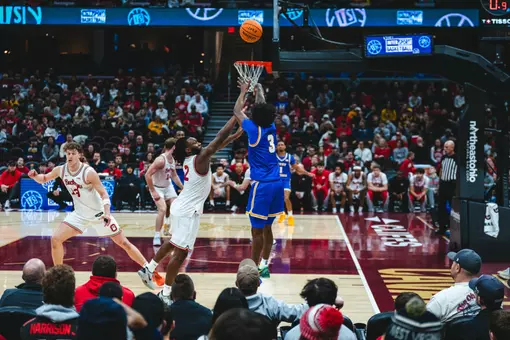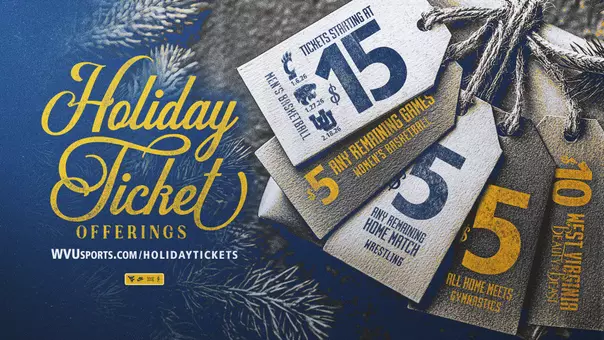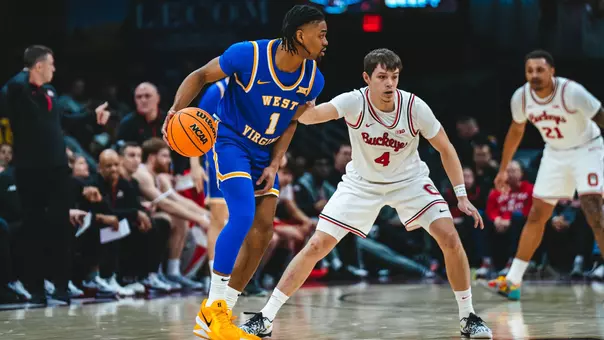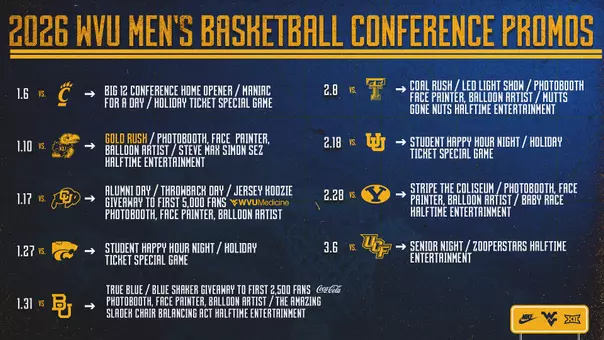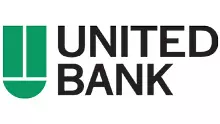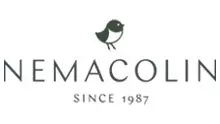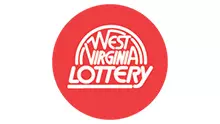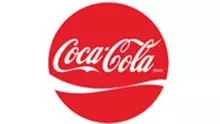
Photo by: All Pro Photography/Dale Sparks
Campus Connection: WVU's History With UK Much Deeper Than You Think
January 24, 2018 02:51 PM | Men's Basketball, Blog
MORGANTOWN, W.Va. - West Virginia and Kentucky have played just 20 times, but a history does exist between these two storied college basketball programs. And it was there well before this recent spurt of NCAA Tournament meetings in 2010, 2011 and 2015.
Back in the late 1950s, West Virginia-Kentucky games carried national significance when the Mountaineers were frequently invited to go down to Lexington to play in the Kentucky Invitational Tournament.
The KIT, as it was known back then, was considered college basketball's premier holiday tournament and getting an invitation from Kentucky coach Adolph Rupp to play in it was a very big deal to aspiring programs such as West Virginia's.
WVU received its first invite to the KIT in 1957 when Jerry West was a sophomore, and the Mountaineers upset the Wildcats, 77-70, at Memorial Coliseum in their Invitational debut. Rupp was so incensed about the loss to the Mountaineers that he spent most of his weekly television show afterward complaining about the Big Ten officiating crew that he hired to work the tournament.
Rupp described 17 different instances when the refs screwed up the game, showing film clips of West Virginia center Lloyd Sharrar traveling before a basket or delivering an elbow to one of his Wildcat players before making another. Sharrar was the tournament's co-most valuable player with Minnesota sophomore center Ronald Johnson.
But Rupp never let his bad temper get in the way of an opportunity to get even, so he invited West Virginia back to Lexington the following year to reclaim the title from the Mountaineers. This time he set it up to where the two teams would meet in the finals instead of the semifinals as they did in 1957.
The seventh-ranked Mountaineers held up their end of the bargain by defeating Oklahoma State, 67-49. The second-ranked Wildcats had little trouble with Ohio State, 95-76, in the nightcap to set up a matchup of two of college basketball's best players - Kentucky's Johnny Cox and West Virginia's Jerry West - in the championship game the following night.
 Despite a 36-point, 16-rebound performance from West, Cox and his better supporting cast outlasted the Mountaineers, 97-91, in an exciting, up-and-down game. West Virginia, using a zone-press defense that would help it reach the NCAA finals that year, held Kentucky without a field goal over the final 4:37 to keep Wildcat rooters on pins and needles.
Despite a 36-point, 16-rebound performance from West, Cox and his better supporting cast outlasted the Mountaineers, 97-91, in an exciting, up-and-down game. West Virginia, using a zone-press defense that would help it reach the NCAA finals that year, held Kentucky without a field goal over the final 4:37 to keep Wildcat rooters on pins and needles.
Cox scored 16 points and grabbed 12 rebounds, but he had plenty of scoring help from guard Sid Cohen (23), forward Bobby Slusher (19) and center Don Mills (17).
Afterward, Rupp called West "the best I've ever seen" and invited the Mountaineers back for a third time in 1959. West Virginia readily accepted because the guarantee money was simply too good to turn down.
West's third appearance at Memorial Coliseum was perhaps his most memorable - and probably the most notorious as far as Kentucky was concerned.
Wildcat forward Allen Feldhaus delivered an elbow to West's nose late in the first half that eventually sent the All-American to the hospital to have it reset. West's broken nose bled so profusely that trainer Whitey Gwynne wasn't sure he could get it stopped.
"This one was awful, and I didn't think it was possible for someone to bleed this much," West recalled many years later. "At halftime, they kind of got it under control and I wanted to play."
And play he did. West scored 33 points and grabbed 18 rebounds to lead the Mountaineers to a 79-70 championship game victory over the Wildcats. He also had more help this night, with junior guard Lee Patrone pouring in 21 points and backcourt mate Jim Warren contributing an additional 16 on several long field goals.
"If you were a Kentucky fan you got credit for breaking his nose - which I'm not proud of at all - and if you weren't a Kentucky fan you got blamed for breaking his nose," Feldhaus said during an interview for ESPN's 2000 SportsCentury profile of West.
Morgantown Dominion News sports editor Mickey Furfari accused Rupp of encouraging his players to rough up West, and word of Furfari's reporting criticizing Rupp's controversial tactics eventually made its way back to Lexington.
In 1962, when WVU was invited to return to the KIT during Rod Thorn's senior season, Rupp had not forgotten Furfari's criticism and instructed his publicity director, Ken Kuhn, not to grant Furfari's credential request until he talked to him first.
Furfari was incensed. He told Kuhn that he would buy his own ticket and cover the games from the stands.
"You can't," Kuhn answered. "It's sold out. You are going to have to talk to Coach Rupp first."
When Furfari calmed down, he agreed to talk to Rupp and soon listened to the Kentucky coach's thunderous voice booming on the telephone, "Boy, I heard you've been writing bad things about me!" he growled.
"That's not true, Coach Rupp," Mickey began. "Some people have suggested you instructed your players to use rough tactics to try and take Jerry West out of the game, and I simply wrote that. I never wrote that you specifically ordered your players to harm Jerry."
"Well, I didn't," Rupp replied.
"Coach, I will be happy to write a clarification tomorrow," Furfari answered. Rupp handed the phone back to Kuhn and Furfari was permitted to cover the tournament.
The WVU-Kentucky game Furfari covered that year was another classic pitting All-Americans Cotton Nash and Thorn against each other.
Both were terrific, Nash scoring 30 points and grabbing 15 rebounds while Thorn contributed 30 points and 14 rebounds. However, once more a UK star had a stronger supporting cast with forward Roy Roberts scoring 19 and guard Scotty Baesler adding 14 in Kentucky's 79-75 victory.
Nash caught fire with 14 minutes to go to help the Wildcats overcome WVU's early double-digit lead.
West Virginia was invited to play in the KIT one final time in 1964, but the Wildcats blew out the Mountaineers, 102-78, as the two programs were heading in opposite directions. Kentucky reached the NCAA finals in 1966 where it lost to Texas Western, which featured an all-African America starting lineup that year, while West Virginia, coached by Bucky Waters, was no longer a top-10 contender playing in a weak Southern Conference being dominated by Davidson's Lefty Driesell.
WVU made its last appearance at Memorial Coliseum in 1969, losing to the Wildcats, 106-87, with Kentucky agreeing to make a return visit to Morgantown a year later to help West Virginia christen its new, 14,000-seat WVU Coliseum.
It was just the second time Rupp had ever brought a Kentucky basketball team to Morgantown. The first occasion, in 1941, he sat and watched his players get called for 27 fouls in a 56-43 Mountaineer victory.
Twenty-nine years later, Rupp hadn't forgotten that miserable night in Morgantown and made sure his team got a better whistle. The lead official that evening was none other than George Conley, the father of former Kentucky player Larry Conley - once an Adolph Rupp Kentucky player!
Even one of the greatest coaches of all-time needed a little help now and again and he got it that night. Kentucky attempted 37 free throws to West Virginia's 21, and those extra foul shots enabled the third-ranked Wildcats hang on for a 106-100 victory.
"We should have won that game, but it was a situation where Adolph Rupp was such a powerful person that he intimidated the referees," West Virginia guard Levi Phillips recalled. "They shot double the free throws we did."
Former West Virginia player and later Mountaineer coach Gale Catlett spent one season working for Rupp during his final season at Kentucky in 1972. Catlett was amazed at the raw power Rupp had accumulated in Lexington during his 41-year coaching career.
Even in his final season there, his control of Kentucky basketball remained unchecked.
"He didn't care if anybody liked him, but he had his system and he was sort of a czar," Catlett recalled in 2010. "He told the media to go to hell; he told the players to go to hell and he told their families to go to hell."
Once, Catlett had observed a very good player make a mistake during practice. Rupp stopped what they were doing and said if the player made the same mistake again he was going to lose his scholarship. Later in the practice, the player made the same mistake, and Rupp threw him out of practice and took his scholarship. A day later, Catlett was sitting at his desk in the basketball office when the basketball secretary came in and said there was a problem.
The mayor from the player's hometown was on the telephone and was demanding to talk to somebody on the coaching staff about the player's expulsion from the team. Catlett got on the line and explained that he couldn't speak for Coach Rupp; he was going to have to talk to him directly.
The mayor asked Catlett to go into Rupp's office and get him on the phone.
"I walked into Coach Rupp's office and I said, 'Mayor so and so is on the line and he wants to talk to you,'" Catlett said. "(Rupp) said, 'You tell the mayor I said hello and I'll talk to him about anything he wants, but if he wants to talk to me about my decision concerning that player then tell him I said go to hell!'
"He wasn't budging," Catlett chuckled.
He never did.
There was one other story concerning Adolph Rupp and West Virginia University, and it revolved around the 1956 recruitment of Eastern Kentucky schoolboy star "King" Kelly Coleman.
The 6-foot-3, 210-pound guard was the top player in the Bluegrass State and one of the most publicized players in the country after scoring 68 points in a single high school state tournament game. Rupp once called Coleman the "greatest high school player who ever lived," describing him as a "combination of Cliff Hagan, Frank Ramsey and Alex Groza."
But Rupp soon soured on Coleman when Coleman informed him that he was planning to sign with West Virginia University. He supposedly told Rupp that he was going to WVU instead of Kentucky because all UK could offer him was a scholarship.
Coleman was never admitted into school in Morgantown because he didn't have enough high school credits, but his recruitment did land the Mountaineers in hot water with the NCAA even though the inducements Coleman had received were from a booster who had nothing to do with the school.
WVU president Irvin Stewart called the NCAA's case "flimsy" and said no one connected with West Virginia University had anything to do with whatever Coleman had received. The implication was that the NCAA investigation into Coleman's recruitment was more a matter of a rival school being vindictive.
The NCAA's informant? Adolph Rupp.
Had Coleman been eligible at WVU he would have been in the same freshman class with Jerry West, giving the Mountaineers the best recruiting class in the country. Coleman ended up a two-time All-American in 1959 and 1960 at Kentucky Wesleyan.
Would Coleman have been enough to get West Virginia the two extra points it needed to beat California in the 1959 NCAA finals?
Who knows?
For that matter, Bridgeport, Ohio's John Havlicek also would have fit in nicely right between Jerry West and Rod Thorn before Ohio State stole him away at the last minute. But I digress.
Nevertheless, there is an extensive history between West Virginia and Kentucky that goes well beyond today's two outstanding coaches Bob Huggins and John Calipari and their recent meetings in the NCAA Tournament.
Perhaps even more history will be made on Saturday night when the Wildcats return to Morgantown for the first time since 1970.
We'll see you there!
Back in the late 1950s, West Virginia-Kentucky games carried national significance when the Mountaineers were frequently invited to go down to Lexington to play in the Kentucky Invitational Tournament.
The KIT, as it was known back then, was considered college basketball's premier holiday tournament and getting an invitation from Kentucky coach Adolph Rupp to play in it was a very big deal to aspiring programs such as West Virginia's.
WVU received its first invite to the KIT in 1957 when Jerry West was a sophomore, and the Mountaineers upset the Wildcats, 77-70, at Memorial Coliseum in their Invitational debut. Rupp was so incensed about the loss to the Mountaineers that he spent most of his weekly television show afterward complaining about the Big Ten officiating crew that he hired to work the tournament.
Rupp described 17 different instances when the refs screwed up the game, showing film clips of West Virginia center Lloyd Sharrar traveling before a basket or delivering an elbow to one of his Wildcat players before making another. Sharrar was the tournament's co-most valuable player with Minnesota sophomore center Ronald Johnson.
But Rupp never let his bad temper get in the way of an opportunity to get even, so he invited West Virginia back to Lexington the following year to reclaim the title from the Mountaineers. This time he set it up to where the two teams would meet in the finals instead of the semifinals as they did in 1957.
The seventh-ranked Mountaineers held up their end of the bargain by defeating Oklahoma State, 67-49. The second-ranked Wildcats had little trouble with Ohio State, 95-76, in the nightcap to set up a matchup of two of college basketball's best players - Kentucky's Johnny Cox and West Virginia's Jerry West - in the championship game the following night.
 Despite a 36-point, 16-rebound performance from West, Cox and his better supporting cast outlasted the Mountaineers, 97-91, in an exciting, up-and-down game. West Virginia, using a zone-press defense that would help it reach the NCAA finals that year, held Kentucky without a field goal over the final 4:37 to keep Wildcat rooters on pins and needles.
Despite a 36-point, 16-rebound performance from West, Cox and his better supporting cast outlasted the Mountaineers, 97-91, in an exciting, up-and-down game. West Virginia, using a zone-press defense that would help it reach the NCAA finals that year, held Kentucky without a field goal over the final 4:37 to keep Wildcat rooters on pins and needles.Cox scored 16 points and grabbed 12 rebounds, but he had plenty of scoring help from guard Sid Cohen (23), forward Bobby Slusher (19) and center Don Mills (17).
Afterward, Rupp called West "the best I've ever seen" and invited the Mountaineers back for a third time in 1959. West Virginia readily accepted because the guarantee money was simply too good to turn down.
West's third appearance at Memorial Coliseum was perhaps his most memorable - and probably the most notorious as far as Kentucky was concerned.
Wildcat forward Allen Feldhaus delivered an elbow to West's nose late in the first half that eventually sent the All-American to the hospital to have it reset. West's broken nose bled so profusely that trainer Whitey Gwynne wasn't sure he could get it stopped.
"This one was awful, and I didn't think it was possible for someone to bleed this much," West recalled many years later. "At halftime, they kind of got it under control and I wanted to play."
And play he did. West scored 33 points and grabbed 18 rebounds to lead the Mountaineers to a 79-70 championship game victory over the Wildcats. He also had more help this night, with junior guard Lee Patrone pouring in 21 points and backcourt mate Jim Warren contributing an additional 16 on several long field goals.
"If you were a Kentucky fan you got credit for breaking his nose - which I'm not proud of at all - and if you weren't a Kentucky fan you got blamed for breaking his nose," Feldhaus said during an interview for ESPN's 2000 SportsCentury profile of West.
Morgantown Dominion News sports editor Mickey Furfari accused Rupp of encouraging his players to rough up West, and word of Furfari's reporting criticizing Rupp's controversial tactics eventually made its way back to Lexington.
In 1962, when WVU was invited to return to the KIT during Rod Thorn's senior season, Rupp had not forgotten Furfari's criticism and instructed his publicity director, Ken Kuhn, not to grant Furfari's credential request until he talked to him first.
Furfari was incensed. He told Kuhn that he would buy his own ticket and cover the games from the stands.
"You can't," Kuhn answered. "It's sold out. You are going to have to talk to Coach Rupp first."
When Furfari calmed down, he agreed to talk to Rupp and soon listened to the Kentucky coach's thunderous voice booming on the telephone, "Boy, I heard you've been writing bad things about me!" he growled.
"That's not true, Coach Rupp," Mickey began. "Some people have suggested you instructed your players to use rough tactics to try and take Jerry West out of the game, and I simply wrote that. I never wrote that you specifically ordered your players to harm Jerry."
"Well, I didn't," Rupp replied.
"Coach, I will be happy to write a clarification tomorrow," Furfari answered. Rupp handed the phone back to Kuhn and Furfari was permitted to cover the tournament.
The WVU-Kentucky game Furfari covered that year was another classic pitting All-Americans Cotton Nash and Thorn against each other.
Both were terrific, Nash scoring 30 points and grabbing 15 rebounds while Thorn contributed 30 points and 14 rebounds. However, once more a UK star had a stronger supporting cast with forward Roy Roberts scoring 19 and guard Scotty Baesler adding 14 in Kentucky's 79-75 victory.
Nash caught fire with 14 minutes to go to help the Wildcats overcome WVU's early double-digit lead.
West Virginia was invited to play in the KIT one final time in 1964, but the Wildcats blew out the Mountaineers, 102-78, as the two programs were heading in opposite directions. Kentucky reached the NCAA finals in 1966 where it lost to Texas Western, which featured an all-African America starting lineup that year, while West Virginia, coached by Bucky Waters, was no longer a top-10 contender playing in a weak Southern Conference being dominated by Davidson's Lefty Driesell.
WVU made its last appearance at Memorial Coliseum in 1969, losing to the Wildcats, 106-87, with Kentucky agreeing to make a return visit to Morgantown a year later to help West Virginia christen its new, 14,000-seat WVU Coliseum.
It was just the second time Rupp had ever brought a Kentucky basketball team to Morgantown. The first occasion, in 1941, he sat and watched his players get called for 27 fouls in a 56-43 Mountaineer victory.
Twenty-nine years later, Rupp hadn't forgotten that miserable night in Morgantown and made sure his team got a better whistle. The lead official that evening was none other than George Conley, the father of former Kentucky player Larry Conley - once an Adolph Rupp Kentucky player!
Even one of the greatest coaches of all-time needed a little help now and again and he got it that night. Kentucky attempted 37 free throws to West Virginia's 21, and those extra foul shots enabled the third-ranked Wildcats hang on for a 106-100 victory.
"We should have won that game, but it was a situation where Adolph Rupp was such a powerful person that he intimidated the referees," West Virginia guard Levi Phillips recalled. "They shot double the free throws we did."
Former West Virginia player and later Mountaineer coach Gale Catlett spent one season working for Rupp during his final season at Kentucky in 1972. Catlett was amazed at the raw power Rupp had accumulated in Lexington during his 41-year coaching career.
Even in his final season there, his control of Kentucky basketball remained unchecked.
"He didn't care if anybody liked him, but he had his system and he was sort of a czar," Catlett recalled in 2010. "He told the media to go to hell; he told the players to go to hell and he told their families to go to hell."
Once, Catlett had observed a very good player make a mistake during practice. Rupp stopped what they were doing and said if the player made the same mistake again he was going to lose his scholarship. Later in the practice, the player made the same mistake, and Rupp threw him out of practice and took his scholarship. A day later, Catlett was sitting at his desk in the basketball office when the basketball secretary came in and said there was a problem.
The mayor from the player's hometown was on the telephone and was demanding to talk to somebody on the coaching staff about the player's expulsion from the team. Catlett got on the line and explained that he couldn't speak for Coach Rupp; he was going to have to talk to him directly.
The mayor asked Catlett to go into Rupp's office and get him on the phone.
"I walked into Coach Rupp's office and I said, 'Mayor so and so is on the line and he wants to talk to you,'" Catlett said. "(Rupp) said, 'You tell the mayor I said hello and I'll talk to him about anything he wants, but if he wants to talk to me about my decision concerning that player then tell him I said go to hell!'
"He wasn't budging," Catlett chuckled.
He never did.
There was one other story concerning Adolph Rupp and West Virginia University, and it revolved around the 1956 recruitment of Eastern Kentucky schoolboy star "King" Kelly Coleman.
The 6-foot-3, 210-pound guard was the top player in the Bluegrass State and one of the most publicized players in the country after scoring 68 points in a single high school state tournament game. Rupp once called Coleman the "greatest high school player who ever lived," describing him as a "combination of Cliff Hagan, Frank Ramsey and Alex Groza."
But Rupp soon soured on Coleman when Coleman informed him that he was planning to sign with West Virginia University. He supposedly told Rupp that he was going to WVU instead of Kentucky because all UK could offer him was a scholarship.
Coleman was never admitted into school in Morgantown because he didn't have enough high school credits, but his recruitment did land the Mountaineers in hot water with the NCAA even though the inducements Coleman had received were from a booster who had nothing to do with the school.
WVU president Irvin Stewart called the NCAA's case "flimsy" and said no one connected with West Virginia University had anything to do with whatever Coleman had received. The implication was that the NCAA investigation into Coleman's recruitment was more a matter of a rival school being vindictive.
The NCAA's informant? Adolph Rupp.
Had Coleman been eligible at WVU he would have been in the same freshman class with Jerry West, giving the Mountaineers the best recruiting class in the country. Coleman ended up a two-time All-American in 1959 and 1960 at Kentucky Wesleyan.
Would Coleman have been enough to get West Virginia the two extra points it needed to beat California in the 1959 NCAA finals?
Who knows?
For that matter, Bridgeport, Ohio's John Havlicek also would have fit in nicely right between Jerry West and Rod Thorn before Ohio State stole him away at the last minute. But I digress.
Nevertheless, there is an extensive history between West Virginia and Kentucky that goes well beyond today's two outstanding coaches Bob Huggins and John Calipari and their recent meetings in the NCAA Tournament.
Perhaps even more history will be made on Saturday night when the Wildcats return to Morgantown for the first time since 1970.
We'll see you there!
Ross Hodge | Mississippi Valley State Preview
Thursday, December 18
United Bank Playbook: Ohio State Preview
Friday, December 12
TV Highlights: WVU 90, Little Rock 58
Wednesday, December 10
Ross Hodge | Little Rock Postgame
Tuesday, December 09
